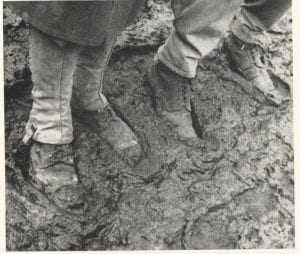This blog post was written by Graduate Student Assistant B.J. Thome. He is a Ph.D. candidate in English Literature in his second year at The Texas Collection. This post is the fourth and final in a series about the 56th Evacuation Hospital, an Army medical unit with close ties to the Baylor University College of Medicine, which was active during World War II.

His greater experience and higher rank gave Henry Winans a broader perspective on the operations of the unit than the junior doctors. Whereas Collins, Galt, and Merrick were concerned primarily with the difficulties they faced treating their own patients on their own wards, Winans often dealt with larger scale concerns. As Chief Medical Officer, he had to oversee the treatment of patients in all unit wards, balance the resources available to support treatments, manage the complaints of doctors and nurses under his command, and deal with military bureaucracy.
As a result of this broader perspective, Winans’s essays and letters are sometimes more reflective than his younger colleagues. One recurring theme that arises is his pride in the work done by the members of the unit. In his essays, Winans repeatedly praises the work of the nurses and doctors serving in terrible conditions. For example, in Dragoni, Italy, the Baylor Unit faced the pervasive problem of rain and mud. Daily rains turned the entire ground to deep mud. Furthermore, since they were living in tents, it was nearly impossible to dry out. Despite these conditions, however, the nurses and doctors excelled in their care for their patients.


Additionally, Winans observes the unit’s night nurses heading from the wards to the mess tent after their shifts and comments on the difficulties they face: “The night nurses for whom this breakfast is supper, are subdued and calm. They have put in 12 hours of taking care of at least 120 patients each with the aid of two ward men. They have admitted patients, fed patients, given medications, watched the seriously ill, administered all the complicated details in black-out. They have gone from tent to tent in the mud with NO light, and inside, have carried on with only a shielded lantern or flashlight. A lonesome job full of heavy responsibility and trying details.”
In another passage, he praises the work of the unit, noting how the doctors and nurses have performed admirably. Despite the mud and rain, the efforts of the 56th allow patients to “have laboratory studies, X-ray studies, and treatment equal to that obtained in the best hospitals at home, [. . .] we deal with the most serious problems such as meningitis, encephalitis, pneumonia and dysentery. Theoretically our seriously ill patients can be evacuated to a general hospital, but practically they are the very ones we have to deal with here because they cannot stand a move of 15 to 50 miles.” The success rate of their treatment was incredibly high. In November of 1943, Winans notes “the medical service has diagnosed and treated over 10,000 cases with only 5 deaths.”

In contrast to the junior doctors emphasizing the problems and difficulties they faced, Winans emphasized the heroism and determination he saw as doctors, nurses, and enlisted men faced their challenges head on. Winans does note the horrors of war’s devastation and the frustrations of military bureaucracy; however, he often chooses to praise the endurance of his fellow officers working to save and preserve lives in the face of those horrors.
No Comments